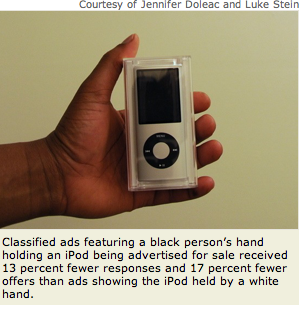Customer’s Racial Preferences – And the Affect on Decisions!
Racial preference is an amazing natural phenomenon. It can also be a difficult force to overcome. The most important thing is to understand racial preference, because if you understand it, you can strategize how to work around it. It may seem natural and you may posses some racially preferential attitudes as well. Think about it!
_________________________________________
 Customer preference in any forum is powerful! Preference in sales is powerful, and manifests itself by creating unfair advantages for one option or another. Racial preference in sales is powerful, and can even be damning against the sales professional that never gets an opportunity because they are the wrong color (regardless of what color they are).
Customer preference in any forum is powerful! Preference in sales is powerful, and manifests itself by creating unfair advantages for one option or another. Racial preference in sales is powerful, and can even be damning against the sales professional that never gets an opportunity because they are the wrong color (regardless of what color they are).
You will remember reading about racial preference in sales and its effects in Black Journal before. This depiction of racial preference in the buying process makes more clear the effect that race has on the decision of who a buyer will potentially work with.
I will define Racial Preference in sales as simple definition that I will give as follows:
The customer choosing to work with a sales professional who is of a particular race or skin color.
That’s it. Simple preference to work with someone on the basis of his or her color or race. It happens every day in one way or another. This is not the most insidious type of discrimination, just the most pervasive. It is also more ‘natural’, and does not seem wrong to many who do it.
There are also opportunities for preference to have minor versus major effects so this one is on the basis of degrees.
We will use an example of “true” racial preference, meaning control of all other externalities. This study was done by Stanford University News, July 19th, 2010 (see the whole article). This story was well done by Louis Bergeron and is essentially a clinical example of what happens when race gets in the way.
A Strong Example of Racial Preference
This example is as clinical as it can be, done by researchers at Stanford. I will use some clips of the dialog, and you will understand the design and results of their tests.
_____________________________
Online shoppers more likely to buy from white sellers than black, Stanford researchers say
When a seller’s race is evident in an online classified ad for an iPod nano, black sellers receive fewer offers and less money than white sellers, says a new Stanford study.
Online shoppers are more likely to buy from a white seller than a black one, according to a study by two Stanford researchers who posted ads on local classified advertising websites across the United States.
Courtesy of Jennifer Doleac and Luke Stein
Classified ads featuring a black person’s hand holding an iPod being advertised for sale received 13 percent fewer responses and 17 percent fewer offers than ads showing the iPod held by a white hand.
The ads offered the latest version of the iPod nano for sale, with each ad containing a photo of either a dark- or light-skinned hand holding the popular digital music player. The ads with a black hand received 13 percent fewer responses and 17 percent fewer offers than ads showing a white hand. Black sellers were also offered less money for the iPods than white sellers.
“We were really struck to find as much racial discrimination as we did,” said Jennifer Doleac, one of the researchers and a doctoral candidate in economics. “On average it’s a younger, more educated group of people shopping online and if anything they probably discriminate less than the population as a whole.”
“We suspect that the negative effect of race would be even larger in the general population,” she said.
Doleac and fellow researcher Luke Stein, also a doctoral candidate in economics, ran ads in more than 300 locales, ranging from small towns to major cities, during the course of a year.
The study showed that black sellers were at the greatest disadvantage in the Northeast, where they received 32 percent fewer offers than whites. In the Midwest, black sellers got 23 percent fewer offers, and they got 15 percent fewer in the South. The West was the only region where the difference in the number of offers received by black and white sellers was not statistically significant.
The amount of money offered black sellers was between 2 percent and 4 percent less than the offers white sellers received. The disparity was most pronounced when the ads were posted in locales with high crime rates or where blacks and whites were geographically isolated from each other.
Buyers responding to classified ads of an iPod for sale made offers 2 percent to 4 percent lower when the iPod was shown being held by a black hand instead of a white hand.
In general, black sellers were at much less of a disadvantage when the ads were posted in more competitive markets, where larger numbers of iPods were for sale, Doleac said.
The iPod listed in the ads was always a silver, 8-gigabyte version of the most recent edition of the nano, which also plays videos. Each ad stated that the box had never been opened and the iPod was for sale because the seller did not need it.
Doleac and Stein never met with the buyers in person. Instead, when it came time to set up a meeting, the researchers said they were out of town and offered to ship the iPod to a buyer’s home, which produced another striking disparity.
Potential buyers corresponding with black sellers were 44 percent less likely to agree to have the iPod shipped to them and were 56 percent more likely to express concern about sending payment to the seller by PayPal.
Doleac and Stein interpreted the buyers’ reluctance as indicating a lack of trust in the sellers. The would-be buyers were also 17 percent less likely to include their name in emails when they responded to ads placed by black sellers.
“The results were obviously disappointing in terms of what they said about the state of society,” Stein said.
Because they never met with any of the buyers, Doleac and Stein have no information on the race of the respondents.
Stanford University News, July 19th, 2010
Study Conducted by Jennifer Doleac and Luke Stein
Article By Louis Bergeron
__________________________
Why This Example? Draw the Parallel!
I chose this as an example because of the simplicity of this display of preference. The difference in the offers on the iPods was simply the color of the hand. There are those who suggest that my characterization of preference might be flawed. I would suggest that there is no clearer and simpler example of racial preference that can be
You need to draw the parallel from this P2P (Personal to Personal) activity to the B2B (Business to Business) and B2P (Business to Personal) sales that most of you undertake every day. The bridge on all of these is simple: In B2B and B2P sales, you always are selling to a person. There is no doubt about that…you are selling to a person and not a company.
Practical Applications
Job Hunt and Resume - The practical aspect of this is that unless you are aware that an organization you are applying to be looking for a minority candidate, you should ‘scrub’ your resume of racial indicators. I discussed this in depth in Black Sales Journal 11/21, Is Your Resume Race Neutral?
Business Cards - Another practical application is that I feel it is important to keep your picture off of your business card. The business card is not an ID, it is your business information in a quick and familiar format. Keep the picture off unless you want it well known as might be the case in some real estate and B2P positions. This was specifically mentioned in Black Sales Journal 2/10/2010 9 Prospecting Tips for the Black Sales Professional.
You want to show that you are the professional looking for the opportunity to solve a customer’s problems. Once you crest the hill we call preference, you can begin to show your true talents.
Always be the best.
Your comments are welcome.
 January 10, 2013
|
Posted by Admin9!
January 10, 2013
|
Posted by Admin9!
 Categories:
Categories:  Tags:
Tags: 

Your Comments